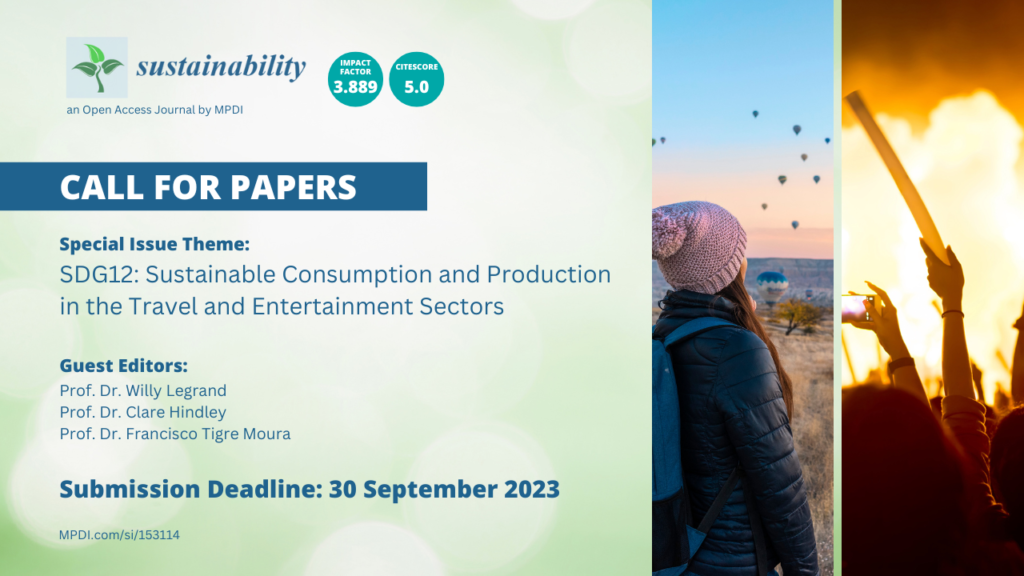Are you currently researching sustainable consumption in the travel or entertainment sectors? Brilliant, we have great news.
The Sustainability journal, an Open Access publication by MDPI, has released a call for papers for a special issue on “SDG12: Sustainable Consumption and Production in the Travel and Entertainment Sectors“. The special issue will be edited by Prof. Dr. Willy Legrand, Prof. Dr. Clare Hindley and myself.
We encourage authors to use innovative methodologies in their research. Research areas may include (but are not limited to) the following:
-
- Business and leisure travel;
- Music, arts, and sports events;
- Net positive experiences and services;
- Regenerative experiences and services;
- Circular products, services, and experiences;
- Communication of sustainable consumption and production;
- Monitoring tools and methodologies;
- Technology innovation and digital solutions for sustainable consumption;
- Consumer motivation, engagement, and consumption behavior.

The UN sustainable goals, which are intended to be achieved between 2015 and 2030, state that sustainability can only be tackled holistically, combining diverse areas affecting individuals, communities, and industry. An analysis of the 2022 goals, however, shows they are still largely unfulfilled. Many of these goals can only be achieved by striking a balance between the use of resources, societal well-being, and consumption. In 2020, the European Commission adopted the Circular Economy Action Plan as a policy to accelerate Europe’s transition towards a circular economy by enabling resources to be permanently reused.
Circular experiences inherently strategize the extraction or production, consumption, disposal, and reintroduction of resources back into the supply chain for the development of a new production cycle. The 2030 goals for sustainable consumption clearly represent an extremely challenging task for all industries. This Special Issue focuses on two highly influential sectors of the experience economy: travel and entertainment.
The travel sector’s significant economic weight comes with both positive and negative socio-cultural and environmental impacts, as well as an opportunity to play a key role in supporting the sustainable development of the economies and communities in which it operates. Moreover, it is experiencing change at an unprecedented speed (from greener travel demands to sustainable technology development), resulting in opportunities as well as challenges and dangers.
Furthermore, the entertainment sector, such as live events for music and sports, is a vital industry for global economies and has the power to shape a culture of sustainable consumption behaviors. However, it has also been responsible for great environmental damage. Music festivals, for example, generate an average of 23,500 tons of waste globally, including plastic bottles, food waste, abandoned tents, and clothing. A recent study published by Live Nation entertainment revealed that 82% of fans support sustainable measures from organizers, a demand that poses both challenges and opportunities.
This Special Issue aims to contribute to the existing literature and knowledge of sustainable consumption and production by focusing on timely and innovative topics in two relevant sectors of the experience economy: travel and entertainment. The focus on UN SDG12 at year 7 in the 15-year plan provides an opportunity to reassess policies and practices and consider effective strategies for the fulfillment of these goals.
Dr. Willy Legrand is Professor of Hospitality Management at the IU International University of Applied Sciences in Germany. Over the past two decades, he has established over two dozen undergraduate and graduate courses on sustainable development in business and hospitality management in Europe, South and North America, the Middle East and Asia. He is the lead author of Sustainability in the Hospitality Industry: Principles of Sustainable Operations 4th ed. (release Spring 2022). Prof. Legrand is also the lead author of Social Entrepreneurship in the Hospitality Industry: Strategies for Change which is a timely addition tackling the many challenges facing the industry in the coming decade.
Clare Hindley is a professor of Language and Communication at the International University of Applied Sciences, Germany responsible for lecturing and planning of diverse areas of management studies. Her international business and education career has included positions in education, human resources and marketing management. Her recent research publications focus on areas of hospitality, tourism, management education, culture and sociology with a cross-disciplinary research profile. Overriding personal and research interest lie in the fields of sustainability, culture, education, and consumer behaviour.
Prof. Dr. Francisco Tigre Moura
Francisco Tigre Moura is a professor of Marketing at the International University of Applied Sciences, Germany. Is responsible for lecturing and planning curses related to consumer psychology and behaviour, coordinates the International Marketing bachelor Program. His research interests include technology expereinces and sustainable consumption in the entertainment sector. He has published multiple studies in scientific jurnals, conferences and is the founder of LiveInnovation.org, a research and education website. He also leads the international monitor project Live FM: FAN MONITOR, which investigates behavioral trends in the music industry.
The submissions are open and will close on 30th of September 2023. The publication is expected for December 2023.
We look forward to receiving your submissions and contributing to the advancement of sustainable consumption and production in the travel and entertainment sectors.
Please submit your papers through the online submission system.











